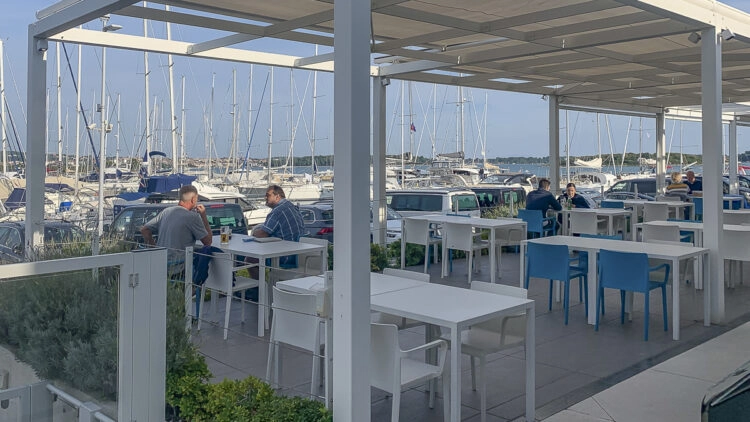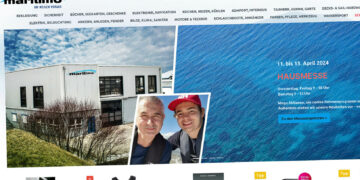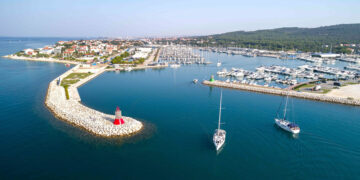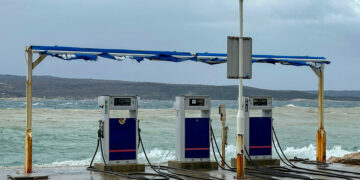After Easter, coronavirus has Croatia in its grip again, high incidence figures, especially in Primorje-Gorski Kotar County, which includes the island of Krk, are forcing coastal regions in particular to take more or less stringent measures, although these vary from county to county. While in Istria with a 7-day incidence of 55.5 and a 14-day incidence of 103.4 according to SeaHelp calculation based on the official figures of the Croatian Ministry of Health almost “business as usual” is still practiced under pandemic conditions, beyond the tunnel Ucka in the county Primorje-Gorski Kotar with a 7-day incidence of 651.9 and a 14-day incidence of 1461.8 (both as of 11. April 2021) harsh measures.
Gastronomy on outdoor terraces of marinas open
To anticipate, however: Those tourists who are currently in Croatia still have the opportunity to eat properly even in Primorje-Gorski Kotar County. Even if even the outdoor terraces of cafes and restaurants are closed again from Monday, April 12, in the marinas, campsites and hotels this rule does not apply, provided that you have booked a berth, a pitch or accommodation there.
Businesses restrict working hours
All other catering establishments must limit themselves to delivery service if they want to offer food. Working hours in stores and supermarkets are sometimes restricted, anyone who is currently in Croatia or planning a stay is advised to check locally as there are definitely regional differences.
Vaccinations for employees in tourism industry
Stricter Corona protection measures have been introduced throughout Croatia, apparently in order not to jeopardize the start of the tourism season from May 2021. Thus, the tourism-dependent country plans to prioritize vaccination of tourism workers as well in order to ensure that its guests have a safe stay in Croatia under the given circumstances. In addition, testing capacity will be expanded to allow returning vacationers to be appropriately tested before entering their home country, thereby circumventing future quarantine rules. On the homepage www.safestayincroatia.hr, one can follow the measures the Croatian government is taking to ensure the safety of its guests from the Corona infection risk.
Many new infections in the workplace
The head of the Primorje-Gorski Kotar headquarters, Mladen Šćulac, blamed the high number of people infected with Corona in particular on infections in the workplace, which were further facilitated by the spread of the highly infectious British mutation. The tourist sector is also not considered a driver of infection in this region.
Croatia: balancing economy and health
Nevertheless, Croatia is under enormous pressure. On the one hand, the country cannot do without revenue from tourism; on the other, the measures needed to effectively combat the Corona pandemic must not unduly weaken the domestic economy. Managing this balancing act is a particular challenge that probably faces most governments in Europe.
Slovenia relaxes lockdown
While Croatia is still strengthening infection control measures, Slovenia is slowly rolling back the lockdown it imposed. Slovenian citizens are once again allowed to leave their region without an exceptional permit, the nighttime curfew has been lifted and some stores are also allowed to reopen.
Slovenia: Entry with test
For entry to Slovenia, the following applies: a 10-day quarantine is imposed on all travelers, regardless of citizenship, entering Slovenia from Austria (excluding Vorarlberg). Persons from Vorarlberg may enter without testing/quarantine.
Exempt from quarantine are persons who can show the following tests or documents:.
- A negative PCR Covid-19 test, not older than 48 hours
- A proof of a positive result for SARS-CoV-2 (PCR test), older than 21 days but not older than 6 months, or a medical certificate that the person has survived a COVID-19 illness and that no more than 6 months have passed since the onset of symptoms;
- proof that they have been vaccinated against COVID-19 and that at least 7 days have elapsed since the 2nd administration of the Biontech/Pfizer manufacturer’s vaccine or at least 14 days have elapsed since the 1st administration of the MODERNA manufacturer’s vaccine or at least 21 days have elapsed since the 1st administration of the AstraZeneca manufacturer’s vaccine;
Transit through Slovenia is possible at any time.













